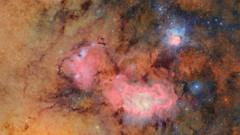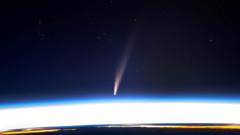For a quarter-century, I’ve had the honor of exploring the universe as The New York Times’ cosmic affairs correspondent. As the year reaches its darkest point, I find myself reflecting on the infinite vastness of the cosmos, a realm filled with mysterious energies and dazzling phenomena. In a fleeting moment, we can imagine ourselves at the center of it all, pondering why we exist among trillions of distant galaxies blurring and dispersing into the abyss.
Having had the privilege to hold the intriguing title of cosmic affairs correspondent, I've covered some of the most significant scientific events of our time. From the depths of the Large Hadron Collider in Geneva to the heights of stormy mountain peaks in Mexico, and from the ethereal expanses of star-filled skies over Chile and Hawaii, my journey has been remarkable. I have lectured on the theories of Einstein in global metropolises and witnessed the haunting remnants of the World Trade Center in the wake of tragedy.
Now, as I step away from my role at The Times, leaving behind my esteemed title but never the purpose it embodies, I look forward to writing a book that intertwines the personal with the cosmic, continuing to engage with readers in these pages sporadically.
Over the years, I witnessed the thrilling outcomes of scientific inquiry — the detection of cosmic ripples from colliding black holes, the unveiling of the Higgs boson, and the realization that our galaxy may host billions of potentially habitable planets. Yet, alongside these discoveries comes the acceptance of the enigmatic “dark matter” that comprises 95% of the universe and the elusive “dark energy” driving a faster expansion of space.
When whispers of gravitational waves stirred the scientific community in 2015, I was skeptical, viewing the Laser Interferometer Gravitational-Wave Observatory as an ambitious venture destined for failure. However, what unfolded over time reshaped our understanding of reality.
As I leave the realm of daily journalism, the mysteries of our universe will always beckon me, promising endless avenues for exploration and understanding. This is not the end but the beginning of another chapter in the pursuit of knowledge and the cosmic truths that bind us all.










